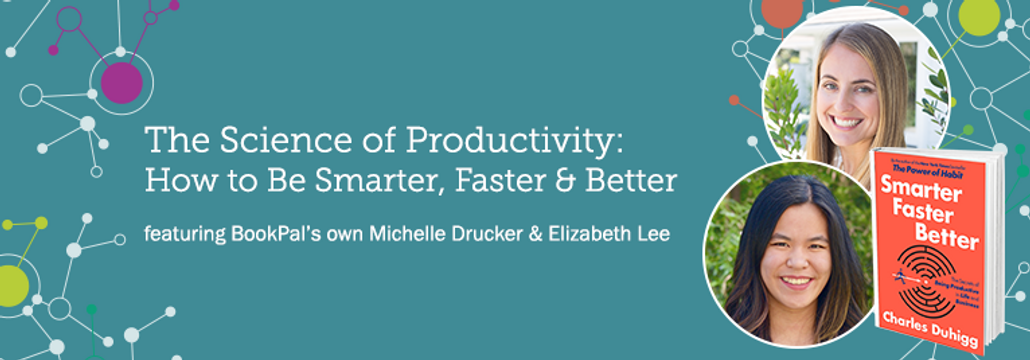
Posted by Michelle Drucker on Apr 05, 2016
The Science of Productivity: How to Be Smarter, Faster & Better
Learn key productivity principles from Smarter Faster Better by Charles Duhigg.
Every other month, BookPal hosts a webinar on a book that we are particularly excited about. Our latest webinar focuses on the science of productivity and highlights key points from the book Smarter Faster Better by New York Times bestselling author Charles Duhigg. During the webinar, we discuss the underlying psychological principles behind what drives people to be smarter, faster, and better, and support each principle with examples from our personal lives and the book!
Watch the full webinar here:
https://youtu.be/74CjuWxD20c
Below, we've outlined a few key points from each chapter of the book:
Ch 1: Motivation
• The key to motivation is to give people a sense of control.
• Train people to have an internal locus of control (the belief that you can influence your destiny through the choices you make) by giving a deeper meaning to their actions.
Ch 2: Teams
• How teams work matters more than who is on them.
• 5 key norms of successful teams:
1. Teams believe that their work is important.
2. Teams feel that their work is personally meaningful.
3. Teams have clear goals and defined goals.
4. Each member know that they can depend on one another.
5. There is a sense of psychological safety.
Ch 3: Focus
• Beware of the dangers automation mode!
• Avoid cognitive tunneling (a mental glitch that sometimes occurs when our brains are forced to transition quickly from automation mode to panicked attention) by creating mental models or pictures of what you expect to happen.
Ch 4: Goal Setting
• Combine SMART goals (Specific, Measurable, Achievable, Realistic, and based on a Timeline) with stretch goals (a seemingly out-of-reach objective) for optimal productivity and innovation.
Ch 5: Managing Others
• The "commitment" culture model — where companies' value people over profits and establish a strong sense of trust between managers, employees and customers — is best for managing others.
• Successful managers give workers a strong sense of control, delegate decision making to the person closest to the problem, insist on a culture of trust, and dedicate themselves to their employees' success.
Ch 6: Decision Making
• Use probabilistic thinking (holding multiple, conflicting outcomes in your mind and estimating their relative likelihoods) to make better decisions.
• Expose yourself to a wide spectrum of successes and failures in order to make more realistic assumptions and expectations.
Ch 7: Innovation
• User personal experiences as raw materials for innovation, mixing old ideas in new ways.
• Embrace creative pain.
• Disturb things just enough in order to spark a new idea.
Ch 8: Absorbing Data
• Avoid information blindness (our mind's tendency to stop absorbing data when there's too much to take in) by engaging with and transforming data.
• Force yourself to do something with the data.
Limited Time Offer!
Interested in purchasing Smarter Faster Better for your organization? Now through 5/25/16, save $20 off your order by entering coupon code SFB20 at checkout!
This post was written by Michelle Drucker, the manager of marketing at BookPal. She is currently reading Sprint by Jake Knapp.





